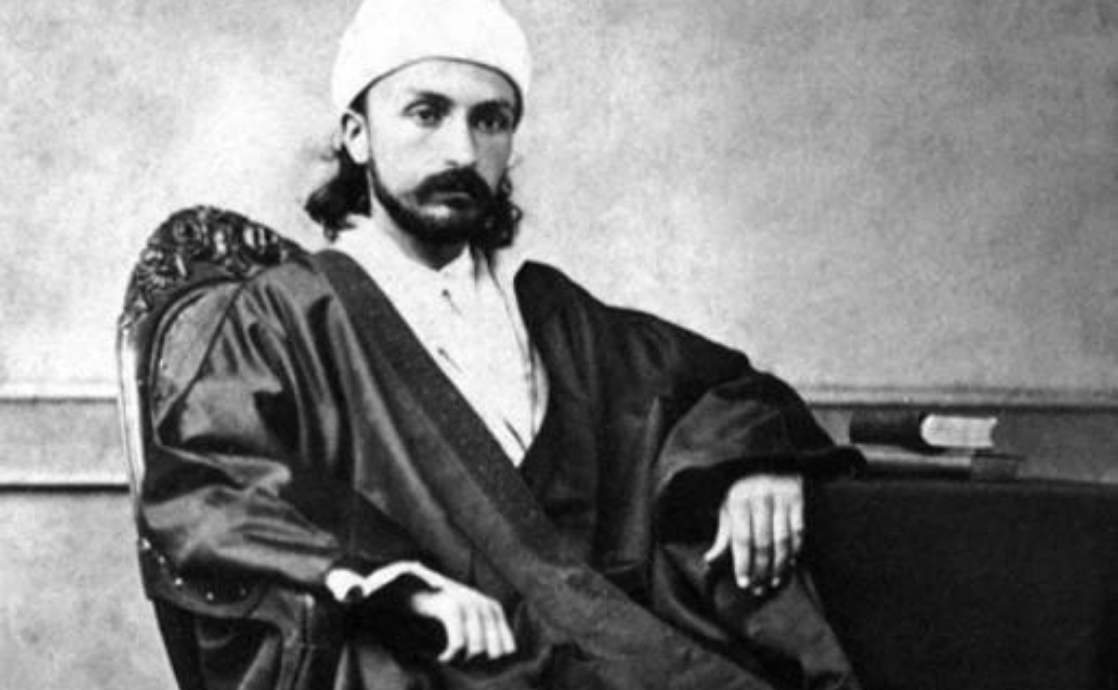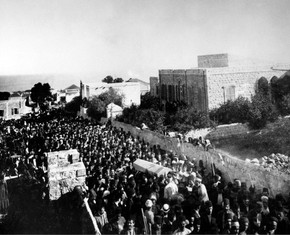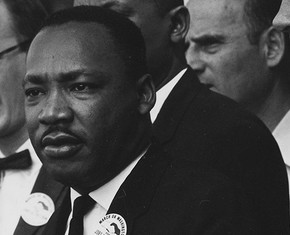The views expressed in our content reflect individual perspectives and do not represent the authoritative views of the Baha'i Faith.
Abdu’l-Baha – the eldest son of Baha’u’llah, the prophet and founder of the Baha’i Faith – was the very first Baha’i. Here, in an excerpt from his secretary Ahmad Sohrab’s diary, Abdu’l-Baha himself explained:
In Baghdad I was a child nine years old. There and then he [Baha’u’llah] announced to me the Word, and I believed him. As soon as he proclaimed to me the Word, I threw myself at his holy feet and implored and supplicated him to accept this one drop of blood as a sacrifice in his pathway.
RELATED: Abdu’l-Baha: The Perfect Embodiment of Universal Love
Baha’u’llah received his initial revelation during the four months he spent jailed in the Black Pit of Tehran in the latter part of 1852. Imprisoned and chained in that terrible place, he learned that he was the promised redeemer his predecessor the Bab and all the holy scriptures had foretold. In December of 1852, when the Persian government decided that Baha’u’llah had committed no crime, they released him from prison, and then, fearing the influence he exerted on the people of Persia, exiled him to Baghdad in early 1853.
Baha’u’llah refrained from publicly disclosing his station or beginning to formally establish his new Faith for a decade – but Abdu’l-Baha knew, and he became the first one to believe in Baha’u’llah’s mission.
Not all of Baha’u’llah’s children succeeded in following the spiritual principles of the religion their father revealed, but Abdu’l-Baha remained faithful for his entire life, dedicating each moment of that life to the Baha’i principles of peace, oneness, and love for the entirety of humanity. He suffered for that choice, confined in prison for 40 years for being a Baha’i. After he was released in 1908, Abdu’l-Baha spent his final 13 years diligently promoting the Baha’i cause and its concepts, traveling the globe as a renowned and powerful antiwar and racial justice advocate, and building the Baha’i administrative order now functioning around the world today.
Does all this explain why so many people love Abdu’l-Baha, or why millions from every conceivable culture, creed, and class consider him their role model? Only partially. Their great love for Abdu’l-Baha comes not only from admiration for his role, but from admiration for how he modeled his inner spiritual life.
In an address he gave in Chicago in 1912, Abdu’l-Baha encapsulated his spiritual approach to others this way:
Be in perfect unity. Never become angry with one another. Let your eyes be directed toward the kingdom of truth and not toward the world of creation. Love the creatures for the sake of God and not for themselves. You will never become angry or impatient if you love them for the sake of God. Humanity is not perfect. There are imperfections in every human being, and you will always become unhappy if you look toward the people themselves. But if you look toward God, you will love them and be kind to them, for the world of God is the world of perfection and complete mercy. Therefore, do not look at the shortcomings of anybody; see with the sight of forgiveness. The imperfect eye beholds imperfections. The eye that covers faults looks toward the Creator of souls. He created them, trains and provides for them, endows them with capacity and life, sight and hearing; therefore, they are the signs of His grandeur. You must love and be kind to everybody, care for the poor, protect the weak, heal the sick, teach and educate the ignorant.
This Baha’i approach to life, exemplified by Abdu’l-Baha in the way he lived and in all of his interactions with everyone he encountered, raises our vision to a higher standard, a more lofty goal, and a nobler purpose. Because he actually lived those principles rather than merely proclaiming them, though, he continues to influence millions.
RELATED: The True Example of How to Live a Spiritual Life
As the first Baha’i, and as the leader of the world’s Baha’is from the date of Baha’u’llah’s passing in 1892 until his own nearly thirty years later, and as the Faith’s true exemplar, Abdu’l-Baha fulfilled a completely unique role in the annals of religious history, as explained here by Shoghi Effendi, the Guardian of the Baha’i Faith and its leader after Abdu’l-Baha’s passing:
He is, and should for all time be regarded, first and foremost, as the Center and Pivot of Baha’u’llah’s peerless and all-enfolding Covenant, His most exalted handiwork, the stainless Mirror of His light, the perfect Exemplar of His teachings, the unerring Interpreter of His Word, the embodiment of every Baha’i ideal, the incarnation of every Baha’i virtue, the Most Mighty Branch sprung from the Ancient Root, the Limb of the Law of God, the Being “round Whom all names revolve,” the Mainspring of the Oneness of Humanity, the Ensign of the Most Great Peace, the Moon of the Central Orb of this most holy Dispensation – styles and titles that are implicit and find their truest, their highest and fairest expression in the magic name Abdu’l-Baha. He is, above and beyond these appellations, the “Mystery of God” – an expression by which Baha’u’llah Himself has chosen to designate Him, and which, while it does not by any means justify us to assign to Him the station of Prophethood, indicates how in the person of Abdu’l-Baha the incompatible characteristics of a human nature and superhuman knowledge and perfection have been blended and are completely harmonized.
In this season, when the world’s Baha’is commemorate Abdu’l-Baha’s legendary legacy during the centenary of his passing, people of every color, nation, and walk of life have paid tribute to the one they call “the Master.” In just one of those tributes* – found here on YouTube – its creators have combined music, photography, and narrated stories of Abdu’l-Baha’s life in a moving record of his sacrificial and altruistic love for all humanity.
*Extracts from: “Abdu’l-Baha, aka ‘The Master’”, by Jonathan Menon; The Oriental Rose, by Mary Hanford Ford, pp. 164-165; The Chosen Highway, by Lady Blomfield, pp. 162-163; Abdu’l-Baha in London, p. 91; Vignettes from the Life of Abdu’l-Baha, by Annamarie Honnold, p. 69; A Prayer by Abdu’l-Baha, available at https://www.bahai.ca/ascension-centenary/visit-a-generous-heart/. Readers: Marielle Audet and Mead Simon. Flute: István Matuz. Piano: Nancy Lee Harper. Music: Suite modale by Ernest Bloch. Produced by Marielle Audet. Music recorded at Hungaroton Radio Studios in Budapest, Hungary, “Flutastic”, Numérica Multimedia Productions, 2010.
















Comments
Sign in or create an account
Continue with Googleor